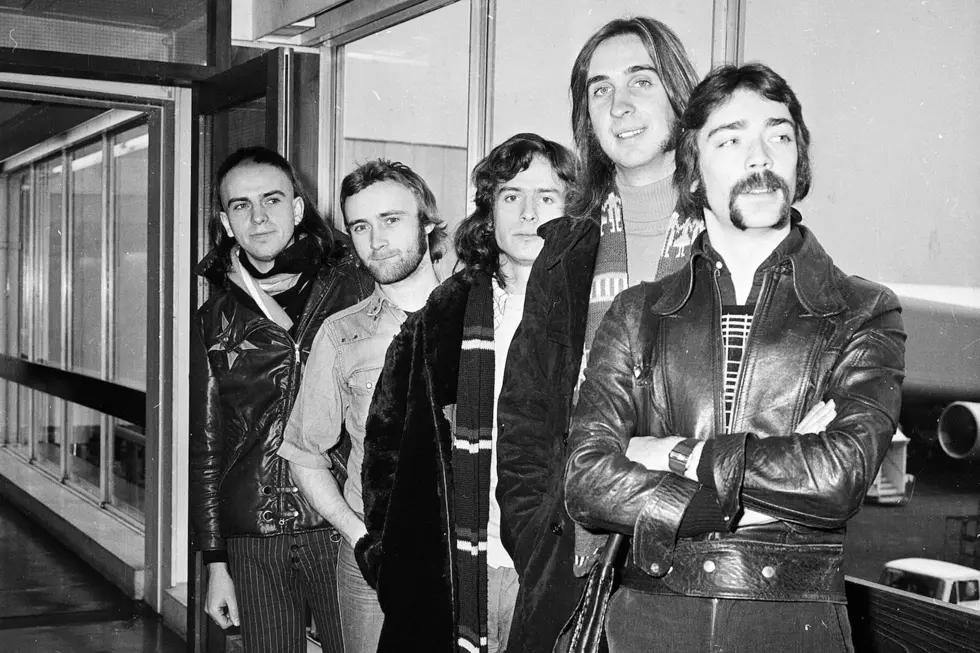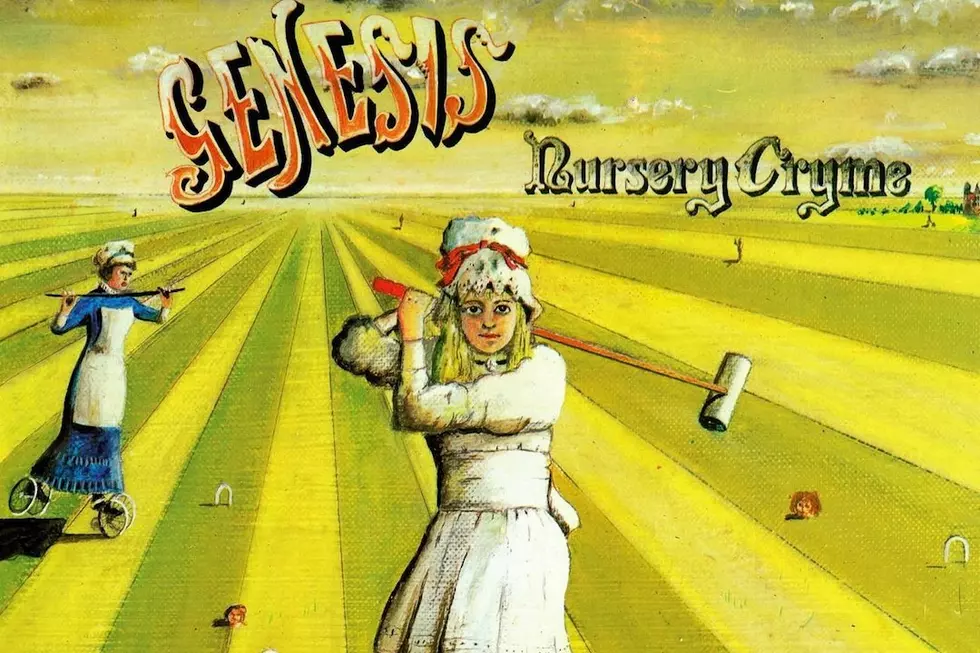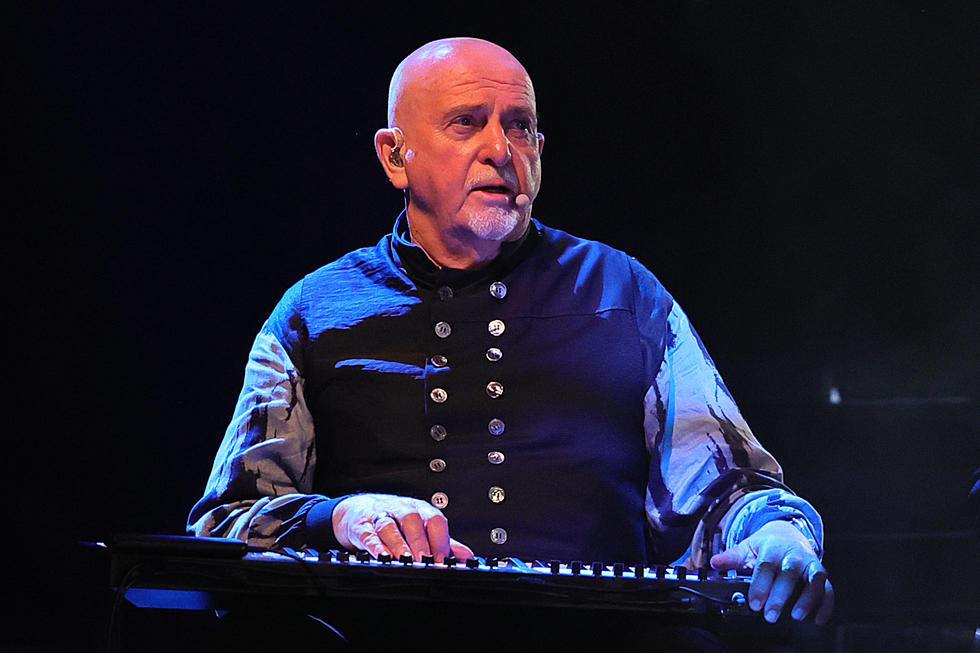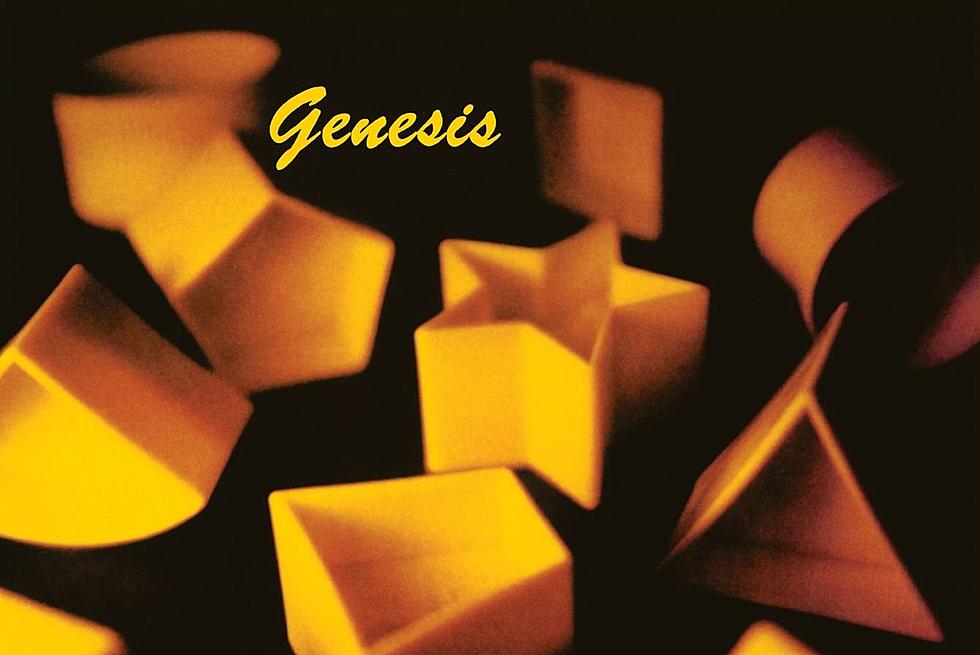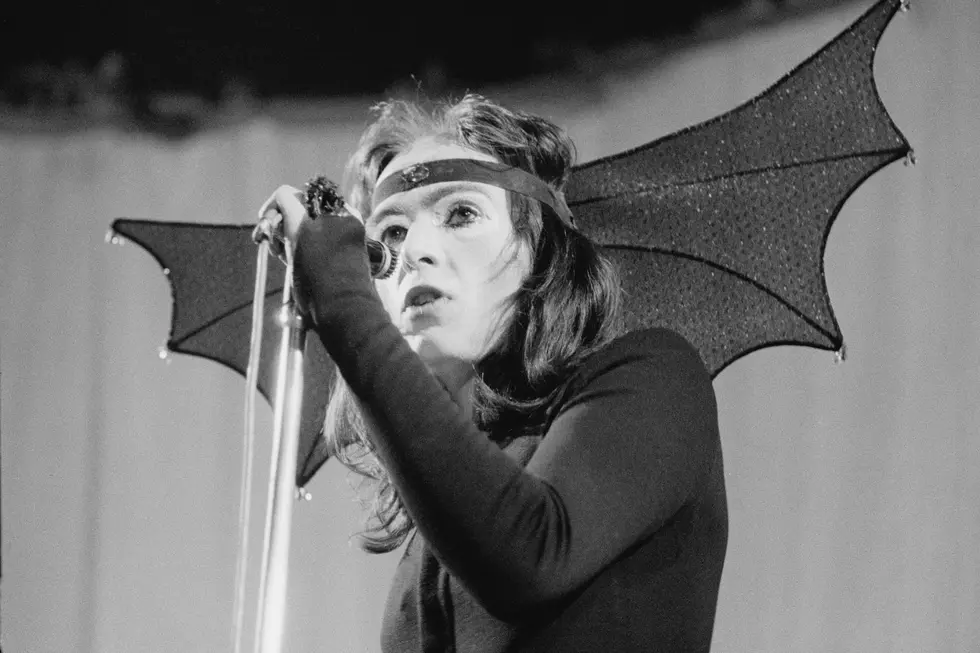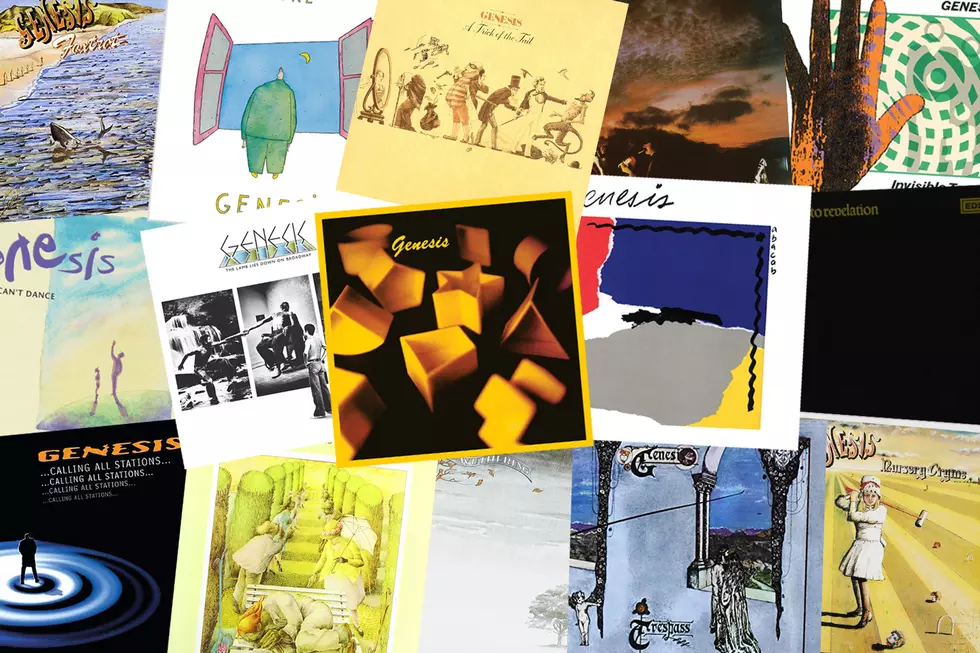
Tony Banks on Genesis’ Early Days, Future Releases and More: Exclusive Interview
Genesis keyboardist Tony Banks spent a good part of 2014 wrapped up in the history of the band with a series of releases, including the R-Kive box set and the Sum of the Parts documentary, which reunited the classic 1971-75 lineup of the group for new interviews, the first time all of them had been in the same room since 1975.
This year, Banks is taking a comprehensive look back at his solo work with a new box set called A Chord Too Far that will be released on Aug. 14. “I’ve written for Genesis all of my career, so in some ways, this is more of the same,” Banks tells us. “With Genesis, we got to the stage where we had an image, and everything kind of went with it. We obviously had two great singers in Peter [Gabriel] and Phil [Collins], who were very good at fronting everything. I couldn’t ever get quite that same attention, I suppose.
“There’s an awful lot of material out there that people listen to and like, and if someone else comes up, [you have to] barge your way in to get noticed, I suppose,” he continues. “I perhaps had slightly more hopes that being within Genesis, I might have gotten a little more attention than I did. But looking back on it now, it doesn’t really worry me anymore. It worried me at the time, but now, I just think, ‘Well, that stuff’s out there,’ and I see that there’s a lot of good material there, so if anyone is hankering after perhaps hearing something that recalls the early days of Genesis, it’s a good place to start.”
In the following interview, Banks discusses the new box set and his incredible career with Genesis and what he’s working on in the upcoming months.
You’ve had a really full career with Genesis. It’s pretty astounding to look at this new box set of your solo work and just realize how much of it there has been. When do you think you really had the chance to first stop down and comprehend the scope of everything you’d done as a solo artist and with bands and collaborations outside of Genesis?
I think after we did the Genesis R-Kive box set and [the] documentary, I thought it was time to put all of these bits and pieces into one place, for my own peace of mind as much as anything else. A lot of this music was no longer available, and I thought there was a lot of good stuff, and I thought that with Genesis still having a bit of a high profile, that it would be a good moment to put it out so that people who have liked Genesis in the past might find some things here that they liked and they didn’t know about.
In the book that comes with this set, you say that “I loved the process of writing and making these albums, but releasing them was not necessarily quite so much fun.” What was it about the process of getting the albums out there that you enjoyed less?
Well, putting them out and getting a bad review, if any, I suppose. [Laughs] Just a lack of enthusiasm for them. They didn’t tend to get much reaction at the time. The first one, A Curious Feeling, got one or two people who gave it sort of a reasonable reaction. But after that, it just got increasingly difficult to make anybody even listen to the things, let alone be positive about them. It was a bit depressing. You’d put them out and you’ve done all this work. Anyone who has ever put anything out that has not been well received knows the feeling. But looking back on all of it this year, I feel very proud of these pieces of music, and I’m very pleased to have a chance to sort of put them out there again just for those people who might have been interested the first time around, but didn’t know I’d ever done them. Everyone knows what Phil and Mike [Rutherford] have been up to and obviously, Peter and stuff, but not very many people know what I’ve done.
Your keyboard sound is very distinctive, much in the same way that if you hear Phil playing drums, you know it’s Phil. If you hear guitar players like Mark Knopfler and Eric Clapton playing guitar, you know it’s them. Where did you really draw your inspiration from as a player in those early days as you were working to develop your sound?
I was a pianist and I probably did introduce a little bit of the classical playing that I’ve done into the rock world, particularly in terms of harmonic usage and more complex chords, I suppose, and some classical styles of playing, particularly the cross-hand techniques I’ve used a lot on The Lamb Lies Down on Broadway and things. These things hadn’t really been used in the rock world at the time. I wasn’t particularly influenced by anyone, apart from perhaps when I was very young, I was influenced by people like Alan Price of the Animals and then probably by Keith Emerson when he was playing with the Nice. He showed me what could be done on the organ, really, because I’d been a pianist and I’d never really played an organ until we started [working on] early Genesis. So I had a lot to learn really, so I learned it from the job in many ways.
When you look back at those early records that you made with Genesis as technology was still developing, listening to records from your band and Yes, it’s really astounding what the bands did with the technology that you had available at the time.
Well, there was a fair amount of stuff out there. What we liked to do, I think, was to try and get the maximum out of the instruments. When I first started out, I just had a piano and then the Hammond organ. So you’d try and do everything you possibly could with that organ -- put it through a fuzzbox, a wah pedal, switch it on and off and see what happened. Generally, you used it in a way that it almost wasn’t intended to be used. So I reckon that 90 percent of what that organ could possibly do, I used. Unlike later on when you get to work with the more classic synthesizers of the late ‘80s where I reckon that I used about one percent of what they were capable of. You switched them on and they sounded great. You found a couple of sounds that sounded really good and that’s what you did. In the early days, you had to be inventive with what you had to get a [different] sound and I will say, being in the band with Steve [Hackett], who is also very masterful with the guitar and could get lots of different sounds with it, the combination of the two of us produced some combinations that were kind of unusual.
Listen to Tony Banks' 'Moving Under'
You and [longtime Genesis producer] Nick Davis remixed some of the material on this box set. What did you want to address by doing that?
We just listened to anything that we thought could be improved. When we did A Current Feeling -- about three or four years ago, we redid the whole record, partly because we were going to remix it in 5.1 -- and that’s also the plan in fact to do with all of these pieces in the end is to release them in 5.1 surround sound. But just one or two of the tracks from the second, third and fourth albums, just seemed to me that they could have been a bit better. I think the tracks I really noticed it most on are things like “The Border,” which was on the album Bankstatement, and also off the same album was “Big Man,” those two tracks in particular, sound a lot better, I think. You can add little bits and pieces here and there and discover bits that weren’t used quite so much. But in a sense, the earlier the album is, the less time you had in the studio with it in a way. And with technology obviously having moved on a lot with computer mixing and everything, it’s so easy now. In the old days, when you did a mix, if one little lick was wrong, you kind of didn’t go back and do the whole thing. Whereas now, obviously you can just redo the little bit, because all of that stuff is in memory, so it’s a different way of working really, so you have a chance to rework things.
I love the approach that you took to presenting the material, as you said, “artistically,” rather than chronologically. It really presents an interesting way to hear all of the material in this set and it really all fits together well.
I spent a lot of time thinking about this. I think that a chronological CD can sometimes get predictable in a way, particularly when people know the records. They expect a certain track after a certain track and everything. And I just thought, you know, all of this was recorded over a period of about 15 years, during which time technology didn’t change all that much, so production values aren’t that different. And they can work pretty well side by side. So I just put all of the tracks together, decided what I’d have done, had they all been released at the same time and I just put it together like an album in that way. So you can put soft tracks next to loud tracks and you can make certain keys all match up in a nice way and all of the rest of it. You can put little bits, like the bit I open [the set] with, which is just an instrumental bit from [the Quicksilver] soundtrack that wasn’t very extensively used. It was a piece I liked a lot and I put that at the front, so it got the whole thing going, really. I just think that it makes people feel that it is something new, and I think it’s good to hear the tracks with a fresh ear. A lot of these tracks, most people won’t know, to be honest, and it just gives a chance for people to hear them in what I think is the best way.
The time that you spent working with all of these records when you look at these albums, is there one where you think you really got it all right or got close?
I have to be honest with you, I like all of them. I don’t really particularly have a favorite -- I kind of go through them all. Of all of them, the one I thought would be successful, was the album Still, which I think has two or three tracks on it that are quite immediate. I think it’s sort of the most immediate of all of the albums in a way, but it didn’t really do anything in relation to the other ones. The one that did the least well was Strictly Inc., which was the last one, but I think that had some of the best moments on it of all. So it’s very difficult for me to sort of judge. I’ll leave it to anybody else who wants to give their opinions. As I said, this is really something for fans of Genesis in a way, I suppose, just to see what I’ve been up to when I wasn’t doing Genesis. You know, everyone knows what Phil and Mike were up to and they don’t know what I was up to, so this is just a chance to put it all in one place so that people can hear it.
You mentioned the Still album, what do you recall about putting together “Angel Face,” when it came to writing and recording that one?
Well, I had written the piece pretty much as a backing track and [mapped out] a lot of the vocals too, all of the way through. I wanted to work with Fish again, because I’d worked with him on “Shortcut to Somewhere” and I really enjoyed that. I thought there was the one track that was on this that would suit his way of thinking, which was “Another Murder of a Day,” and so I [also] had this other track that I thought his voice would really suit. Now, Fish is one of those singers who doesn’t really like to sing a written melody -- he’s much happier if you give him the idea and he can do his own thing on it a bit. But I had a very strict melody that I wanted to be sung on this one and rather against his will, I made him sort of like, you know, just do it like that. And I think it’s actually really good, because he has got a great tone to his voice and when you’re trying to get all of the notes absolutely right, like he does, he actually sounds really good. He gets that sort of, you know, the kind of vitriol that the song has in a way.
When I write a lyric, I like to put myself in the position of someone else, really, because my own life is fairly mundane, so I had this idea of some person, which is not a difficult thing to imagine, who had some woman who did him a lot of wrong. So coupled with that, I made the guitar on it very bluesy, because it’s almost like a blues lyric in a way. It’s one of the stronger songs on the record, I think, actually. I really like the results.
As you mentioned, you had worked with Fish before. How did the two of you initially connect and start collaborating?
I had this song that I wanted to do for the film Quicksilver and he was suggested as a possible collaborator. Originally, I wasn’t too sure. Because Marillion at the time were very closely compared to Genesis and everything, and I thought maybe it was a bit obvious. But then in the end, I thought, “Well, what the hell, he’s got a good voice, so give it a go.” We met up and we got on really well and he wrote the lyric on “Shortcut to Somewhere” and I had a sort of outline for the melody, but he kind of did his own thing on it a little bit, which is how he’s happiest to work. We produced a good result and since we got on really well, when I came around to doing the Still album, I knew I wanted to use different singers and I thought I’d get in touch with him again and do that. I had this one longer piece, “Another Murder of a Day,” which I thought would have fitted into perhaps a Genesis mood kind of thing, a prog rock track anyway. But I also wanted to do the simpler song, because I thought his voice would really suit it.
“An Island in the Darkness,” from the Strictly Inc. album, is one of the longer things on this box set. How did that one come together?
I made a conscious decision on that record to try and write something a little bit more involved in that kind of way. I had a few piano bits and improvisations of things that I thought were quite interesting and I wanted something to hang it all on. I had this melody line that actually occurred during a Genesis jam session and we hadn’t really used it, and I thought that I might use that as a sort of an idea and play it quiet and play it loud, a bit like perhaps I’d done in the early days with Genesis and stuff and do a more ambitious kind of piece. It’s about 60 or 70 percent instrumental, and the lyric kind of describes the various changes you sort of go through in it. I loved the idea of [the long] span and I didn’t really worry about repeats and format and everything like that with “An Island in the Darkness,” because it’s a bit like we used to do in the old days with sort of the earlier songs like “Supper’s Ready” and everything, where you went from piece to piece without worrying too much about middle eights and choruses and verses and stuff, which was fun to do. I think it’s the strongest piece on Strictly Inc and it’s one of my favorite pieces on the box set, actually.
You always seemed to have good luck finding good people to sing the material you were working on.
I think I’ve been lucky with the singers. They’ve all been good, really. With Fish and Nik Kershaw, I had some people with names that people knew, so it kind of help a little bit in terms of getting slightly more profile and everything. I would just listen to tapes that people would send me to try and find a singer.
You mentioned the 5.1 reissue plans for your solo work. Is there other stuff that you’d like to release outside of Genesis? Is there anything in the video vault that you’d like to release someday?
The idea at some point is to put out all of these records again with surround-sound mixes, and it will have the extras, like the videos and stuff, on them. My main focus these days tends to be more on the orchestral stuff that I’ve been involved with the last 10 years, which also is highlighted obviously on the fourth CD on this box set. There are a couple of suites that I’ve written for orchestra and I’m working on a third one. So that’s kind of given me a kind of new lease on life in a way, because back in the late ‘90s after we did the Calling All Stations Genesis project, I wasn’t sure what I was going to do next, so I decided that orchestral [music] was an area I wanted to try to work in. It’s actually worked quite well for me really, over here in particular. So that’s what I’ve been doing recently enough and what I’m continuing to do.
Listen to Tony Banks' 'Red Day on Blue Street'
Calling All Stations was a solid record. It would have been interesting to see where that lineup might have gone with a second record. Did you guys get into a second record at all?
Yeah, well it’s a funny thing, really. I wasn’t particularly keen to do the first record. Mike was keen on the idea. He said, “Look, let’s just go and see what happens. We’ll try writing some stuff and see what happens.” We wrote some stuff and we liked what we did and we got in Ray [Wilson] and everything. Once we’d done the first album, I was looking forward to doing a second one, really, because I thought we had something going and we also by that time knew Ray’s voice and we could work with it differently. I was also quite keen to use the drummer and the guitarist that we’d actually used on the road on that record, but Mike felt, and perhaps in some ways, rightly, what he didn’t really want to happen was for Genesis to sort of suddenly go down the other side of a hill. Which could have happened, because obviously Calling All Stations wasn’t so successful and who knows if a lot of people who might have bought Calling All Stations on spec and not liked it, and the next record might have not really done too well. Anyhow, in the end, we decided not to do it and that’s how it turned out really. But I think there could have been a record there that could have been interesting, but it didn’t happen.
You guys put out the R-Kive box set and the documentary, as you mentioned. Is there anything else currently in the works?
Not Genesis-wise, no. I think we’ve pretty much scraped the barrel. That’s pretty much everything there is. So there’s nothing else, and there’s no other material around that could be used. In a sense, the documentary is kind of, I suppose, a wrap-up in a way. In the future, who knows what will happen? We’re all still alive and we’re still around, but there’s no plans for anything else.
I know there was talk at one point about putting out some live shows from the recorded archives. Shows that had been recorded over the years outside of the ones that were officially released. Are you guys still looking at the option of doing that?
Well, they’re sort of there. We’ve still got some tapes and stuff. It’s just one of those things that just never seems that interesting to us, but I know that there are some fans who would like it. But it is really just the same old material, again and again. I don’t know how many times you can listen to a version of whatever it happens to be. It’s one of those things that we may do it, because I know people keep talking about it. But it’s not something that we feel is totally important, really. But the stuff is there so at some point we might put some of it out.
What are some of your personal stand-out keyboard solos (or moments) that are favorites from over the years?
God, I always think of myself more as a writer than a keyboard player, so the keyboards are sort of a factor. I think the “Apocalypse in 9/8” from “Supper’s Ready” is one of the things that always stays with me, particularly the way it ends with the chord sequence that was used. Because it sort of had such a strong atmosphere without anything on it -- without the vocals. It was just so impending and then Peter put his fantastic vocal on top of it and it hits you with these impending chords that lead to the sort of very serene chord sequence that comes down at the end. I think that’s one of the strongest moments in Genesis. Another one that I really like is the piece “Fly on a Windshield,” from The Lamb Lies Down on Broadway, the way it goes from quiet to loud and the sort of mellotron bursts fifths and everything come in. It’s a very powerful moment, I think. If you have to take one second of Genesis, that would be the one second I would take, when it kind of goes from quiet to loud in that moment.
With this solo box coming out, have you ever considered the idea of doing a tour, playing some of this stuff and putting together a band?
Not really. I mean, over the years when people have asked me this when each record comes out, I’ve always said, “Well, if the record did anything, I might be tempted to go out there and play it live.” But since none of them ever did anything, I kind of never did it, and I think it’s a bit late now. It’s quite a big thing to go out there and do all of this stuff and to play music that’s never been played live before, and also it’s a lot of music that would be unknown to a lot of the audience , if you could get an audience at all.
See Genesis and Other Rockers in the Top 100 Albums of the '80s
Rock's Most Criminally Underrated Albums
More From Ultimate Classic Rock
